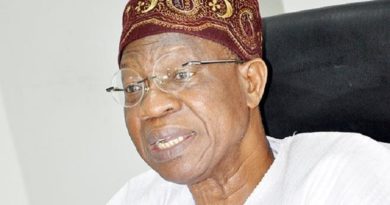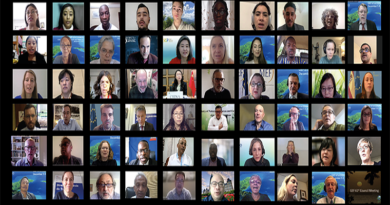Air Pollution: SRADeV Nigeria calls for urgent action over ‘unsound’ industrial recycling practices in Nigeria
World Environment Day, celebrated since 1974 on June 5, is the United Nations day for encouraging worldwide awareness and action to protect the environment. 2019 event is organized around a theme that addresses a particularly pressing environmental concern -air pollution. This is apt for Nigeria, an agenda setting for the attention of the incoming federal and states government.
Air pollution is a deadly, man-made problem, responsible for the early deaths of some seven million people every year, around 600,000 of whom are children. It is estimated that 90 per cent of the world’s population breathe polluted air. Every five seconds, somebody around the world dies prematurely as a result. In Nigeria, ‘the situation is alarming and remotely the major cause of untimely deaths today and as civil societies we are deeply concern about the continued lip-service attention of the government’.
Today in Nigeria, polluted air is creating a national public health emergency especially in all urban cities. It threatens everyone from unborn babies to children walking to school, to women selling their wares in the open, to industrial workers, and even unsuspecting residential/commercial dwellers to every office worker. On the street and inside the house, the sources of air pollution are noticeably seen and evidently alarming with deadly effects: asthma, other respiratory illnesses and heart diseases etc overstretching the nation’s present inadequate health infrastructure. As if that is not enough, exposure to dirty air also harms brain development, leading to cognitive and motor impairments, while at the same time putting children at greater risk for chronic disease later in life.
“As we mark the World Environment Day, Sustainable Research and Action for Environmental Development (SRADeV Nigeria), a SAICM United Nations NGOs focal point of chemicals pollution and management in Nigeria, urge the incoming Federal and State governments and the legislatures to take bold action to beat air pollution, improve health, address climate change, and fulfil citizen’s human rights obligations,” said Dr Leslie Adogame, Executive Director, SRADeV Nigeria. “Since pollution and poverty go hand in hand, Nigeria been described as the ‘poverty capital of the world’. The implication is that more people will likely die from air pollution-related diseases in the coming years if urgent public emergency action plans are not put in place”, said Adogame.
Another concern is that, in the quest for attracting foreign investment for local growth and employment opportunities, Nigeria in the past 20 years has slide to becoming a dumping ground for all kinds of unregulated ‘unsound’ industrial practices and activities. Thanks to President Buhari for recently addressing the ongoing theft of Nigerian jobs by foreigners particularly Chinese and Indians, but the government must not stop here.
Our recent survey carried out between September 2018 and February 2019, at the new Lagos-Ogun state industrial corridor – Ikorodu and Ogijo communities, revealed that about 90% of industries operating in those locations (mostly owned by Chinese and Indians) are operating below the required environmentally accepted standard. These companies openly release toxic substances into the atmosphere and ecosystem, in the name of recycling, while government regulatory agencies look the other way. Our finding substantiates that “instead of ‘green recycling’, incessant ‘brown recycling’ activities takes place all over, we are stunned by how these complacent industries impact on the nation’s already huge uncalculated environmental and occupational costs. This unwrapping of the recycling industries’ ‘dirty little secret’ was met with shock and dismay”, said Adogame. Our survey also revealed that babies, school children, women in these poorer communities are those most exposed to the recalcitrant pollutants. From our survey, “the country is presented with a nightmarish vision of where another lifestyle of ‘toxic colonialism’ and unregulated industry can lead us”, said Mr. Victor Fabunmi, Senior Programme Officer.
According to the pollution index released in 2019 (https://www.numbeo.com/pollution/rankings_by_country.jsp), Nigeria is ranked 6th most polluted country among 106 countries, with high index of 87.37% above other African countries like Egypt, Ethiopia, Kenya, Tunisia, Tanzania, Morocco, Algeria while South Africa is among least polluting countries.
SRADeV Nigeria hereby call on the National Environmental Standards Regulatory and Enforcement Agency (NESREA) and State Environmental Protection Agencies (EPAs) to be awaken to their responsibility and to urgently undertake immediate national monitoring of air quality and its impacts on human health; assessing sources of air pollution; establishing and enforcing air quality legislation; and developing air quality actions plans to safeguard people health towards attaining the SDGs. In other to monitor this as watchdogs of the environment, SRADeV plans to inaugurate an ‘NGO Think Tank Roundtable on Environment’ to serve a pressure group by July 2019 in Lagos.
The right to a healthy environment enjoys constitutional status – the strongest form of legal protection available – in more than 100 countries. Nigeria is among the at least 155 states that are legally obligated, through treaties, constitutions and legislation, to respect, protect and fulfil the right to a healthy environment. Air pollution goes to the heart of social justice and global inequality, disproportionately affecting poor people. The right to clean air is also embedded in the Universal Declaration of Human Rights and the International Covenant on Economic, Social and Cultural Rights, and fully enshrined in the Sustainable Development Goals – the global blueprint for peace and prosperity.
We therefore call for urgent national public health emergency over ‘unsound’ industrial recycling practices in Nigeria.




